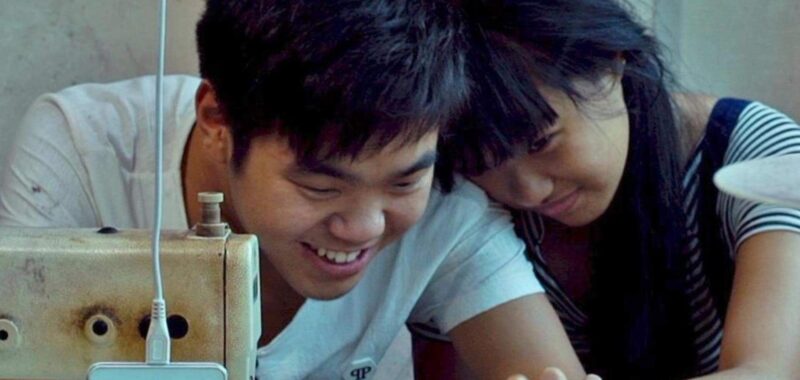Over his career, filmmaker Wang Bing has concerned himself chiefly with two social threads in China: examining the legacy of the country’s various 20th-century revolutions (as seen in titles like 2007’s Fengming, a Chinese Memoir, 2018’s Dead Souls, and last year’s Man in Black) and surveying how the working class survives the modern tides of globalization (see 2002’s Tie Xi Qu: West of the Tracks, 2008’s Crude Oil, or 2012’s Three Sisters). To further his explorations of the latter theme, Wang and a crew spent significant time in Zhili, a garment-making hub of the industrial eastern city of Huzhou, between 2014 and ‘19. They shot around 26,000 hours of footage among the town’s hundreds of thousands of seasonal migrant workers.
That project has so far yielded multiple cinematic projects. Bitter Money (2016) is a broad look at this milieu and the people within it. 15 Hours (2017) is a video installation that simply sits with one textile worker at his sewing machine for the namesake length of time. And last year saw the release of Youth (Spring), a three-and-a-half-hour look at the many people in their teens or early 20s who staff these workshops. Spring was the first part of a documentary trilogy; its second and third installments, Youth (Hard Times) and Youth (Homecoming) debuted at film festivals this year. Both are now playing at the New York Film Festival, giving any cinephile willing to sit for a combined run time of over six hours a chance to catch up.

Hard Times is the trilogy’s odd duck. Though there are no shared characters between the films, it is structurally identical to Spring, as it comprises scenes shot in Zhili’s textile workshops and workers’ dorms. Like Spring, it lets these sequences play out at great length — this film runs for nearly four hours — before breaking away from Zhili for a closing sequence that follows one of the young characters as they return to their rural hometown for the new year.
The primary difference between Spring and Hard Times, which were shot simultaneously, is that the latter places a much greater emphasis on the friction between the workers and their bosses. Young interviewees relay horror stories they’ve heard about other workshops — tales of supervisors who underpay, are violent with their underlings, or skipped town with their paychecks in pocket. When one boss up and vanishes in the film, the workers mill confusedly for a bit before pragmatically stripping the workshop for parts to resell, so they, too, can get some scratch out of the ordeal. One excruciating sequence sees 20-something-year-old Wanxiang trying to find his payroll book while his boss stubbornly insists that he can’t get paid without it. Though scenes of workers negotiating their rates make up a smaller, though still notable, subplot in Spring than in Hard Times, where they are prioritized, the heavy stylistic overlap between the two films makes the latter feel redundant.

Homecoming is where Wang breaks the narrative mold established by the first two films, adopting a fresh, more intriguing structure. (It’s also notably shorter than the others, running “just” two and a half hours.) There’s much less footage of the workshops; as the title suggests, the focus is on young folks going home for holidays, during which time they catch up with family, celebrate festivals, get married, have children, and otherwise simply live. Wang captures some of the trilogy’s best moments here: A van ride over a muddy one-lane mountainside road feels deeply treacherous. A young couple have a winningly rowdy wedding, and then later care for their newborn. An experienced textile worker shows a novice how to work a machine.
The film has an alternating rhythm: It starts in the workshops, then follows some of the characters on a trip home, then returns to the workshops, goes on a different visit, and so on, with each sequence being progressively shorter. It skillfully compresses the five years of the shoot, replicating the way that long hours at work and the respite of home can turn into a blur over time. The film could easily stand on its own, but its comparative lack of scenes in the workshops mean that the relief the characters (and the audience) feel with their visits is much more acute in the context of all we’ve seen in the previous two documentaries. Though the footage in Spring and Hard Times could have perhaps been better off when combined into one feature, the trilogy presents a wealth of poignant, striking material. And if the many scenes of people in workshops ever feels boring or repetitive to watch, try to imagine what it must be like to actually have to do that work, day in and day out.

Youth (Hard Times) and Youth (Homecoming), directed by Wang Bing (both 2024) are both playing at the Elinor Bunin Munroe Film Center (144 West 65th Street) as part of the 2024 New York Film Festival, which runs through October 14 at Lincoln Center.

